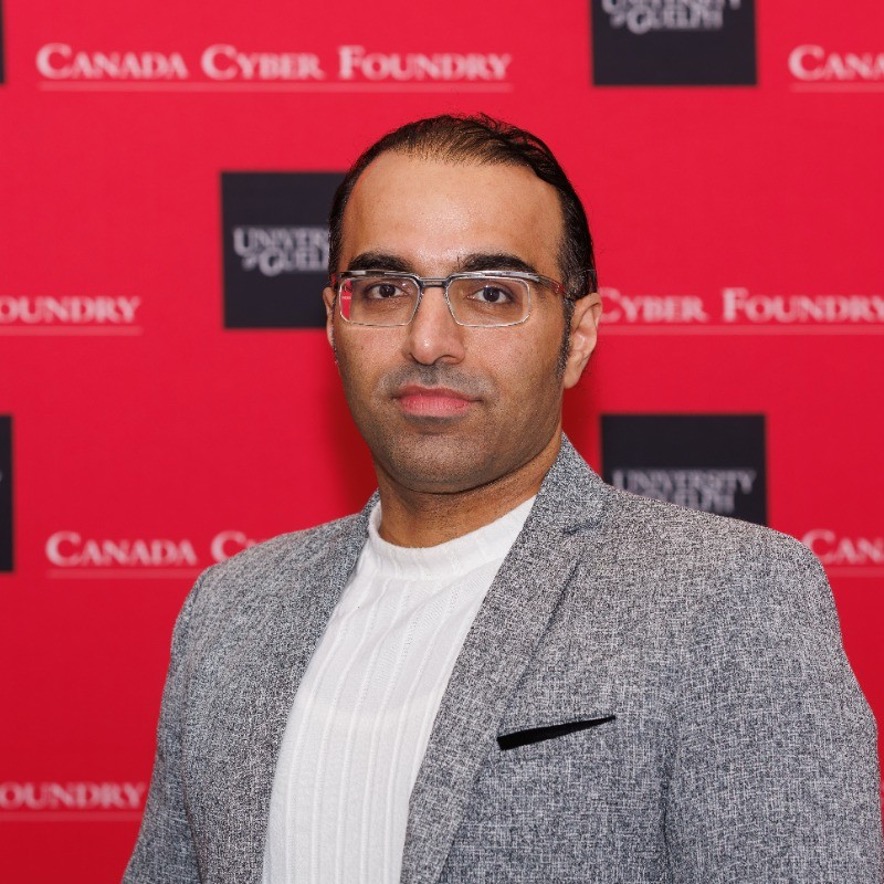Once cyberattacks were rare incidents; now phishing attempts, deepfake phone scams and data breaches are daily realities.
To tackle the rise in cybercrime, the University of Guelph’s new Master of Cybersecurity Leadership and Cyberpreneurship (MCLC) is launching fall 2025 and aims to create the next generation of chief information security officers and cybersecurity business leaders.
Incorporating both technical expertise and business strategy, this first-of-its-kind program in Canada equips students to lead and redefine cybersecurity, says program director Dr. Ali Dehghantanha, Canada Research Chair in Cybersecurity and Threat Intelligence and professor in the School of Computer Science.
“There is a gap in the market for those who can lead, manage and conduct the human side of cybersecurity,” he says.
Dr. Sean Lyons, associate dean (research and graduate studies) at the Gordon S. Lang School of Business and Economics adds, “Today, millions of cybersecurity jobs are unfilled. Major organizations are struggling to attract cybersecurity talent.”
He continues, “The future of cybersecurity demands leaders who can think critically, innovate strategically and inspire others. Our graduates will work within organizations and develop new ventures that will shape the future of the industry.”
Cybersecurity master’s developing tomorrow’s business leaders
To that end, students will graduate ready to become leaders and managers of cybersecurity teams, cybersecurity thought leaders, policymakers and researchers.

The focus on cybersecurity entrepreneurship, or cyberpreneurship, may also help graduates create their own start-ups, as the program teaches the complex operational, legal, compliance and fundraising challenges unique to the cybersecurity field.
Many opportunities for experiential learning are built right into the program.
Students can expect to build and manage a cybersecurity program and to protect companies against cyberattacks in multiple courses. They will also learn from Lang School management professors the challenges of hiring and retaining people, with additional opportunities to connect and network with like-minded individuals and entrepreneurs from the industry.
An internship is also offered at the end of the program. One pathway allows students to work with existing companies in various roles. Another involves collaborating with leaders for those students interested in starting their own business.
The program is delivered jointly by the School of Computer Science in the College of Engineering and Physical Sciences (CEPS) and the Lang School of Business. Helping to shape the program are representatives from Microsoft and cybersecurity companies including ISA Security, eSentire and Arctic Wolf.
“I’m excited about this groundbreaking partnership, which demonstrates our commitment to providing innovative and interdisciplinary professional education,” says Lyons.
A focus on remote learning throughout the year, with a one-time in-person intensive course, helps keep the program accessible for working professionals. Those with non-specialist backgrounds are especially welcome.
First cyberpreneurship master’s program will shape Canada’s future
Dehghantanha says the new master’s program is crucial for Canada’s future.

“We are positioning U of G among the very few think tanks in cybersecurity that can serve the field for years ahead,” says Dehghantanha. “We’re not only providing high-quality education at the post-graduate level and above – we’re advising on policies and government procedures, building future jobs for Canadians in this field.”
Dehghantanha is the founding director of Canada Cyber Foundry (CCF), a centre for cybersecurity research training and professional development at U of G. Connecting academia with industry organizations and non-profits, CCF ensures the program is up to date with industry standards and is inclusive and accessible for prospective students and partners.
The program builds off the success and popularity of the Master of Cybersecurity and Threat Intelligence (MCTI), launched at U of G in 2019 by Dehghantanha, which has grown significantly in the past several years. Such innovative education from CEPS has positioned U of G as one of Canada’s top computer science schools.
“The University of Guelph is continually looking at how we can meet the needs of society, not only today but in the future, through high-quality, relevant training,” says Dr. Moncef Nehdi, dean of CEPS.
The new master’s program will complement MCTI by providing working professionals who do not necessarily have the technical background for MCTI and who strive for more people-based leadership roles.
“We are thrilled to co-launch this innovative program that combines the strengths of business leadership and cybersecurity expertise. It reflects our commitment to equipping students with the skills needed to excel in a rapidly evolving digital world,” says Dr. Sara Mann, dean at the Gordon S. Lang School of Business and Economics.
Prospective students can apply through the Ontario Universities’ Application Centre with an ongoing application deadline.
More information is available on the official MCLC program website and in the program brochure.
